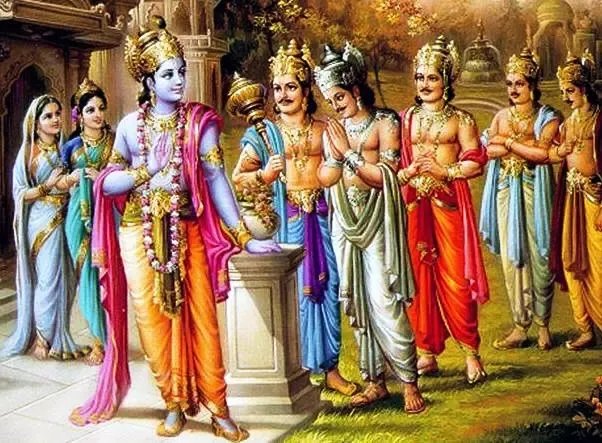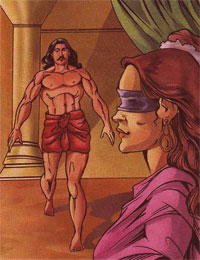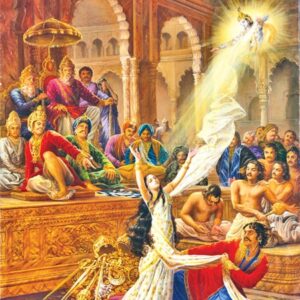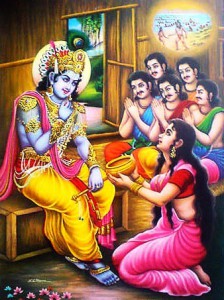The Influence of the Modes of Material Nature
In the journey of life, every individual is influenced by the modes of material nature, known as “gunas” in Sanskrit—sattva (goodness), rajas (passion), and tamas (ignorance). These modes shape our thoughts, actions, and destinies. The story of Duryodhana and the Pandavas is a powerful illustration of how these modes affect individuals and their decisions, often leading them into destructive patterns.
Duryodhana: Trapped in the Whirlpool of Material Nature
Duryodhana, the eldest of the Kauravas, was a man consumed by envy and hatred, particularly towards the Pandavas, his cousins. His jealousy was especially directed at Bhima, the second Pandava brother. Bhima’s strength and prowess in battle made Duryodhana feel threatened, and this feeling intensified over time, entangling him in the whirlpool of the material modes, particularly rajas (passion) and tamas (ignorance).
Duryodhana’s life was a constant struggle against these internal whirlpools. His envy and desire for revenge against Bhima and the Pandavas fueled his actions, leading him deeper into the cycles of anger, jealousy, and hatred. These emotions were like the waves of the ocean, sometimes rising and sometimes subsiding, but the whirlpool—the central, unending turmoil—remained, continuously pulling him down.
One example of this whirlpool effect is when Duryodhana, filled with jealousy, sought to humiliate the Pandavas even after they were exiled to the forest. Despite having already secured the throne by deceit, Duryodhana was not satisfied. He wanted to show off his power and make the Pandavas feel his dominance, which led him to the forest with a large army under the pretext of counting his cows—a task that didn’t require such a show of force.
The Counsel of Dhritarashtra and Shakuni’s Manipulation
Duryodhana’s father, Dhritarashtra, though blind, could see the dangerous path his son was on. He had a soft spot for the Pandavas and often advised Duryodhana to refrain from provoking them further. However, Duryodhana, heavily influenced by his uncle Shakuni, was unable to break free from his destructive desires. Shakuni, who harbored his own vendetta against the Pandavas, cunningly manipulated Duryodhana, further entangling him in the whirlpool of the modes.
Dhritarashtra’s advice to Duryodhana to be content and to avoid further confrontation with the Pandavas was ignored. Duryodhana’s mind was set on revenge, and he could not see the wisdom in his father’s words. Instead, he followed Shakuni’s suggestion to take a large army into the forest, ostensibly to count the cows but really to intimidate the Pandavas.
The Whirlpools of Anger and Revenge
This journey into the forest symbolizes the deeper entrapment of Duryodhana in the whirlpool of material nature. When Duryodhana arrived near the Pandavas’ camp, he was stopped by the loyal followers of the Pandavas, who refused him passage. This rejection only fueled his rage further, pushing him deeper into the whirlpool of revenge and anger.
Duryodhana, blinded by his emotions, insisted on pressing forward. However, his forces were overpowered by the Pandavas’ allies, and he was captured. This humiliation was the result of his own actions, driven by the modes of passion and ignorance. The very forces he had hoped to use to display his power became the instruments of his disgrace.
Yudhishthira: Beyond the Modes
In stark contrast to Duryodhana, Yudhishthira, the eldest Pandava, was a personification of sattva (goodness). Even though Duryodhana had wronged him and his brothers in countless ways, Yudhishthira did not harbor enmity. When he heard of Duryodhana’s capture, he immediately sent Bhima and Arjuna to rescue him. Yudhishthira’s actions were not motivated by revenge or hatred but by a sense of duty and righteousness.
This difference in response highlights how Yudhishthira, although affected by the waves of material nature like everyone else, remained above the whirlpool that consumed Duryodhana. Yudhishthira’s focus on dharma (righteousness) kept him aligned with the principles of goodness, allowing him to act with compassion even towards his enemies.
The Tragic End: Duryodhana’s Downfall
Duryodhana’s inability to rise above the modes of material nature ultimately led to his downfall. Despite being released by the Pandavas, his hatred and envy never subsided. He continued to plot against them, leading to the great Kurukshetra war, where he was ultimately defeated by Bhima in a brutal duel. His entire life, consumed by the whirlpool of material desires and negative emotions, ended in tragedy.
Conclusion: Escaping the Whirlpools of Material Nature
The story of Duryodhana and the Pandavas serves as a profound lesson on the effects of the modes of material nature. While we all experience the waves of these modes—sometimes feeling uplifted, sometimes dragged down—it is the whirlpools of unchecked negative emotions that pose the greatest danger. These whirlpools can trap us in cycles of anger, jealousy, and revenge, preventing us from moving forward in our spiritual journey.
The key to escaping these whirlpools is to cultivate sattva, the mode of goodness, through practices such as meditation, prayer, and selfless service. By aligning ourselves with dharma and focusing on the divine, we can rise above the lower modes of material nature and avoid the tragic fate of those like Duryodhana.
A Prayer for Liberation from the Modes
O Lord Krishna,
Guide us through the waves of material nature,
And protect us from the whirlpools of negative emotions.
Help us to cultivate goodness in our hearts,
So that we may rise above anger, envy, and hatred.
Grant us the wisdom of Yudhishthira,
To act with righteousness and compassion,
Even towards those who wrong us.
May we focus on Your divine presence,
And remain steady in the face of life’s challenges.
Free us from the bonds of material nature,
And lead us towards liberation and eternal peace.



